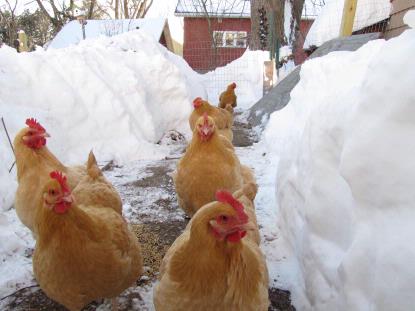“The girls and I have been talking and I think we have a bit of a situation. Whatever this white cold stuff in the run is, it’s not in the least bit entertaining. It’s time to talk about going somewhere a bit warmer until this cold spell passes. I’ve heard good things about Cancun.”

At this point I knew she was all bluster and no puff. Chickens don’t do well in Cancun. Furthermore, let’s face it, chickens don’t migrate. Some people do, but chickens don’t. I probably couldn’t convince Tiny of this while a mound of snow blocks her view of the door whence food emerges from, but migrating is costly. Many bird species don’t migrate at all. In other populations only the females or the young migrate.
Migration costs a lot in terms of energy, so a migratory bird must store up fat. Of course that’s also how the bird can get through winter, so for a given species to begin migrating there has to be an advantage to migrating over staying put. Complicating this is the fact that when the flock arrives at its destination, say Cancun just for argument, there will already be birds there. The carpetbagging birds must then food and shelter. It’s not as if Senor Frog’s throws open its doors to migrating house sparrows.
Canada Geese, famous for flying south, have started to realize that if treated with kid gloves humans can be pretty good partners. We make really pleasant frost free ponds for them to hang out on in the winter. Since humans tend to overfertilize land that drains into ponds, we’ve spurred the growth of lovely goose food. Now they don’t have to waste all that energy flying south and waiting to get into Margaritaville. Leave that to the monarchs. Instead Canada Geese spend the winter floating around on golf course ponds and outside the UMass fine arts center commenting on the art.
Avian migration occurs in part because of genetics, but populations may migrate earlier, later or not at all based at least partly on weather and climate. At http://www.learner.org/jnorth/ you can follow migrations of all sorts of birds and other animals. I was interested to note that Massachusetts’s first robin of “spring” was spotted on January 10 in Whittinsville, MA. I don’t really think I’ve ever stopped seeing them, but perhaps they head south just for the fall – maybe they object to leaf peepers and come back as soon as the holidays are over.
In any case, the total cost of migration could never be worth it for Tiny and her flock. Our coop is dry and kind of warm. I give them plenty of food, shovel their run and their water is clean – at least it is when I set it out. Best of all I give them a little tuna most days to help them keep warm. This is all free of cost Tiny. I’m not paying for you to winter in Cancun.


